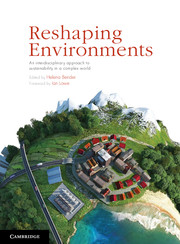Book contents
- Frontmatter
- Contents
- Contributors
- Acknowledgements
- Introduction Reshaping environments – an opportunity for envisioning the future
- Part 1 Cases
- Part 2 Skills
- 9 Critique, analysis and reflection in the study of reshaping environments
- 10 Working with complex issues in group situations
- 11 Understanding research methodology
- 12 An interdisciplinary approach
- Part 3 Theory
- Index
- Plate Section
- References
11 - Understanding research methodology
from Part 2 - Skills
Published online by Cambridge University Press: 05 February 2013
- Frontmatter
- Contents
- Contributors
- Acknowledgements
- Introduction Reshaping environments – an opportunity for envisioning the future
- Part 1 Cases
- Part 2 Skills
- 9 Critique, analysis and reflection in the study of reshaping environments
- 10 Working with complex issues in group situations
- 11 Understanding research methodology
- 12 An interdisciplinary approach
- Part 3 Theory
- Index
- Plate Section
- References
Summary
Introduction
Throughout your academic studies you will read and hear about many research efforts. The purpose of this chapter is to equip you with the tools required to understand, analyse and evaluate the research you are studying, so your studies can benefit from this deeper critical analysis. The chapter introduces the activity of research, both in general and in its academic context. It explains the concept of research methodology, and outlines the relationship between method and methodology. The logical structures that underlie research methodologies, and the main ways that these logics can go wrong, are explored. Then a range of assumptions and values implicit in the choice and practice of a range of research methodologies are unpacked and presented. Along the way, a number of examples of research are analysed, to demonstrate the analytical skills used.
What is research?
In a general theoretical sense, research is a carefully planned inquiry or study. All research presumes that careful planning is more likely to lead to valid and reliable results or outcomes than unplanned study or inquiry. This is partly because random guesses are unreliable, but also because once a process has been planned and, particularly if it is recorded, the process can be reviewed, repeated or changed when things do go wrong or when someone else wants to understand what has been done. Thus research enables a sense of conversation and development in inquiry and study.
- Type
- Chapter
- Information
- Reshaping EnvironmentsAn Interdisciplinary Approach to Sustainability in a Complex World, pp. 242 - 255Publisher: Cambridge University PressPrint publication year: 2012
References
- 1
- Cited by



